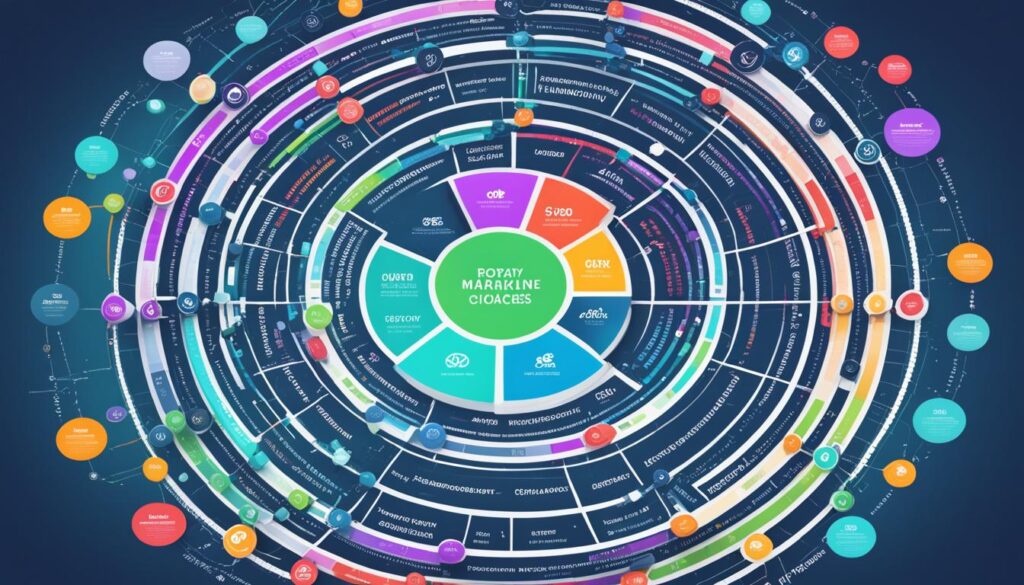Big data and affiliate marketing are two powerful strategies that can drive increased sales and revenue for businesses. By harnessing the power of data-driven marketing and utilizing affiliate programs, businesses can optimize their sales efforts and generate more revenue. In this article, we will explore the role of big data in affiliate marketing and how it can help businesses achieve remarkable sales and revenue growth.
Understanding Big Data in Affiliate Marketing
In affiliate marketing, big data refers to the collection and analysis of large datasets that are too complex for conventional data-processing technologies. By tracking consumer behavior through cookies, businesses can gain a deeper understanding of their customers and deliver more relevant advertising. This level of customer understanding allows affiliates to target their marketing campaigns more accurately and achieve higher conversion rates and a higher return on investment (ROI).
By leveraging big data in affiliate marketing, businesses can unlock valuable insights and improve the overall effectiveness of their marketing strategies. The abundance of data sets provides a wealth of information that can be used to optimize advertising relevance and drive greater customer engagement.
Using big data analytics, marketers can examine the vast amounts of data collected and uncover patterns and trends that can be strategically applied to their affiliate marketing campaigns. This data-driven approach results in more informed decision-making and empowers affiliates to make data-backed optimizations that increase the chances of success.
Additionally, big data allows businesses to evaluate the performance of their affiliate marketing efforts and determine the most profitable avenues. By analyzing the data, marketers can identify which affiliates or channels contribute most significantly to the overall revenue generation. This enables businesses to prioritize and allocate resources effectively, maximizing their ROI.
The Impact of Big Data in Affiliate Marketing
“Big data is revolutionizing the way affiliate marketing operates. By harnessing the power of data analytics, businesses can optimize their marketing strategies for success and achieve greater revenue growth.”
Furthermore, big data offers an opportunity to measure advertising relevance accurately. By tracking and analyzing customer interactions, businesses can ensure that their advertising efforts align with user preferences and remain contextually relevant.
Overall, the integration of big data in affiliate marketing provides businesses with a competitive advantage in the digital landscape. By utilizing data-driven insights, affiliates can enhance their understanding of customers, optimize marketing campaigns, and ultimately boost sales and revenue.
The Role of Data Sets in Affiliate Marketing
Data sets are the foundation of big data in affiliate marketing. These sets contain vast amounts of information collected from various sources and channels. As marketers dig deeper into these datasets, they can gain valuable insights into consumer behavior, preferences, and trends.
Customer understanding is at the core of successful affiliate marketing. By analyzing data sets, marketers can understand their customers’ needs, desires, and pain points. This understanding allows them to create personalized and targeted marketing campaigns that resonate with their audience.
For example, by analyzing data sets, marketers can identify the preferred communication channels of their customers. They can determine if their target audience prefers email marketing, social media advertising, or other forms of communication. Armed with this knowledge, affiliates can optimize their marketing efforts and deliver the right message through the right channels, increasing the chances of conversion.
| Data Sets in Affiliate Marketing | Key Benefits |
|---|---|
| Consumer Behavior Analysis | Gain insights into customer preferences and behavior to optimize marketing strategies. |
| Personalization | Create tailored marketing campaigns to target specific customer segments. |
| Trend Identification | Stay ahead of market trends and capitalize on emerging opportunities. |
| Performance Tracking | Analyze the effectiveness of marketing efforts and make data-driven optimizations. |
The Role of Big Data in Affiliate Marketing
In the world of affiliate marketing, big data plays a critical role in driving success and optimizing strategies. By harnessing the power of big data, affiliates can gain valuable insights and improve their overall performance. Let’s explore how big data impacts affiliate marketing and uncovers new opportunities for revenue generation.
Competitor Analysis and Insights
Big data allows affiliates to analyze and understand their competitors’ marketing strategies on a deeper level. By gathering and analyzing data on competitors’ campaigns, affiliates can gain valuable insights into what works and what doesn’t. This knowledge helps them fine-tune their own marketing efforts and stand out in a competitive landscape.
Utilization of CRM Systems
A customer relationship management (CRM) system is essential for successful affiliate marketing. CRM systems powered by big data can track conversions, engagement, and customer behavior, providing affiliates with invaluable information. By leveraging the insights from CRM systems, affiliates can identify new opportunities and tailor their campaigns to suit the preferences and needs of their target audience.
Monitoring Sponsored Search Advertisements
Sponsored search advertisements play a crucial role in affiliate marketing campaigns. With big data, affiliates can monitor the effectiveness of their sponsored search ads, evaluate their performance, and make data-driven decisions to optimize their return on investment (ROI). This ensures that the ads are reaching the right audience and generating revenue.
Network Selection for Optimal Results
Choosing the right affiliate marketing programs and networks is vital for success. Big data enables affiliates to make informed decisions based on performance data and analytics. By analyzing the data from different affiliate networks, affiliates can select the most suitable ones for their specific niche and target audience. This targeted approach enhances the overall success of their affiliate marketing efforts.
With the capabilities provided by big data, affiliate marketers have access to a wealth of information that empowers them to make data-driven decisions, optimize their campaigns, and unlock new opportunities for revenue generation. By leveraging big data in affiliate marketing, businesses can stay competitive and achieve remarkable results.

The Impact of Big Data on Affiliate Marketing Campaigns
Big data has revolutionized the landscape of affiliate marketing campaigns, empowering marketers with real-time data insights for informed decision-making and increased effectiveness. By leveraging the power of big data, affiliate marketers can evaluate partnerships, scale campaigns, and optimize marketing strategies for better results.
How does big data enable informed decision-making?
Big data provides affiliate marketers with valuable insights into consumer behavior, preferences, and trends. By analyzing vast amounts of data, marketers can identify patterns and make data-driven decisions to optimize their affiliate marketing campaigns. This ensures that marketing efforts are focused on the right audience, resulting in higher conversion rates and increased revenue.
The role of big data in partnerships evaluation:
Big data allows affiliate marketers to evaluate the performance of their partnerships. By analyzing data related to partner activity, conversion rates, and revenue generated, marketers can make informed decisions about the effectiveness of their partnerships. This enables them to identify high-performing partners and allocate resources accordingly, maximizing the impact of their campaigns.
Scaling campaigns using big data:
With big data, affiliate marketers can effectively scale their campaigns by analyzing the performance of different marketing strategies. By measuring the success of various tactics and channels, marketers can allocate resources to the most effective channels and optimize their campaign scaling strategies. This ensures that marketing efforts reach a wider audience and generate higher returns on investment.
Optimizing marketing strategies with big data:
Big data provides affiliate marketers with insights that help optimize their marketing strategies. By analyzing data on customer behavior, preferences, and engagement, marketers can tailor their campaigns to deliver personalized and relevant content. This targeted approach ensures that marketing efforts are more impactful and result in higher conversion rates.
Overall, the impact of big data on affiliate marketing campaigns cannot be overstated. By leveraging real-time data insights, affiliate marketers can make informed decisions, evaluate partnerships effectively, scale campaigns efficiently, and optimize marketing strategies for remarkable results.

Affiliate Marketing Statistics and Trends
Affiliate marketing has experienced significant growth in recent years, with a market value of over $17 billion and projections of reaching $40 billion by 2030. More than 80% of brands utilize affiliate marketing programs to boost website traffic and drive sales.
Google searches for “affiliate marketing” have doubled since 2016, indicating increased interest and adoption. Consumers are turning to online platforms to learn about affiliate marketing strategies and opportunities.
Influencers have a substantial impact on purchase decisions, with 88% of consumers being influenced by recommendations. Brands are capitalizing on this trend and collaborating with influencers to promote their products and services.
Customer reviews play a crucial role in purchase decisions, with 9 out of 10 consumers relying on them. Positive reviews and testimonials from satisfied customers help build trust and confidence in affiliate marketing products and services.
Amazon Associates holds the largest market share in the affiliate marketing industry, thanks to its vast product selection and trusted brand reputation. Affiliates often partner with Amazon to promote products and earn commissions.
Affiliate marketing accounts for 16% of eCommerce sales in the US and Canada. It demonstrates the significant impact affiliates have on driving online sales and revenue generation.
Furthermore, blogging is a popular strategy among affiliate marketers, with 84% of online content publishers engaging in affiliate marketing. Bloggers leverage their platforms to promote affiliate products and earn income from commissions.
Affiliate Marketing Statistics and Trends
- Market Value: Over $17 billion, projected to reach $40 billion by 2030.
- Brand Adoption: More than 80% of brands utilize affiliate marketing programs.
- Google Searches: Doubled since 2016, indicating increased interest and adoption.
- Influencer Impact: 88% of consumers are influenced by influencer recommendations.
- Customer Reviews: 9 out of 10 consumers rely on customer reviews in purchase decisions.
- Affiliate Market Share: Amazon Associates holds the largest market share.
- eCommerce Sales: Affiliate marketing accounts for 16% of eCommerce sales in the US and Canada.
- Online Content Publishers: 84% of online content publishers engage in affiliate marketing.

Benefits of Big Data in Affiliate Marketing
Big data offers numerous benefits in the context of affiliate marketing. By leveraging the power of data analytics, affiliates can make informed decisions and develop effective marketing strategies. With access to real-time data, affiliates can optimize their campaigns, target the right audiences, and stay competitive in saturated markets.
One of the key advantages of big data in affiliate marketing is the ability to identify new opportunities. By analyzing vast amounts of data, affiliates can uncover emerging trends, consumer preferences, and untapped markets. This allows them to tailor their promotional efforts and capitalize on new revenue streams.
Furthermore, big data facilitates the evaluation of partnerships in affiliate marketing. Affiliates can analyze performance metrics, track conversions, and assess the impact of different partnerships on their sales and business goals. This data-driven evaluation helps affiliates make strategic decisions in selecting the right partners and ensures mutually beneficial collaborations.
In addition, big data plays a crucial role in campaign scaling. By analyzing performance data, affiliates can identify which campaigns are driving the most conversions and revenue. This insight allows them to allocate resources effectively, scale successful campaigns, and optimize their marketing strategies for maximum impact.
Benefits of Big Data in Affiliate Marketing
| Benefits | Description |
|————————————-|—————————————————————————————————————————————————————————————————|
| Informed Decision-making | Big data provides real-time insights, enabling affiliates to make data-driven decisions and optimize their marketing strategies. |
| New Opportunities | Data analysis helps affiliates identify emerging trends, consumer preferences, and untapped markets, creating new opportunities for revenue growth. |
| Partnership Evaluation | Big data allows affiliates to evaluate the impact of different partnerships on sales and business goals, helping them select the right partners for successful collaborations. |
| Campaign Scaling | Analyzing performance data empowers affiliates to scale successful campaigns, allocate resources effectively, and optimize their marketing strategies for maximum impact. |
| Market Competitiveness | Leveraging big data enables affiliates to stay competitive in saturated markets by targeting the right audiences and tailoring their promotional efforts based on consumer insights. |

“Big data is the key to unlocking the full potential of affiliate marketing. By harnessing the power of data analytics, affiliates can make more informed decisions and stay competitive in the dynamic digital landscape.”
In conclusion, big data provides significant benefits in the realm of affiliate marketing. It empowers affiliates to make informed decisions, identify new opportunities, evaluate partnerships, scale campaigns, and enhance market competitiveness. Embracing big data is essential for achieving remarkable sales growth and maximizing the revenue potential of affiliate marketing.
Conclusion
Big data and affiliate marketing go hand in hand to drive business growth. By harnessing the power of big data, affiliate marketers can make informed decisions, identify new opportunities, evaluate partnerships, and scale their campaigns effectively. With data-driven marketing strategies and well-executed affiliate programs, businesses can achieve remarkable increases in sales and revenue.
Integrating big data into affiliate marketing brings a competitive edge in the digital landscape. It enables businesses to tap into valuable insights, understand customer behavior, and deliver highly targeted advertising. By leveraging the power of big data analytics, affiliates can optimize their marketing efforts and enhance conversion rates, ultimately leading to revenue growth.
As the affiliate marketing industry continues to grow, harnessing the power of big data is essential for success. By unlocking the potential of data-driven decision-making, businesses can stay ahead of the competition and maximize their sales and revenue potential. Embracing big data and affiliate marketing is a winning combination for driving business success in today’s digital era.
FAQ
How can big data drive increased sales and revenue growth?
Big data enables businesses to gain a deeper understanding of their customers, target marketing campaigns more accurately, and achieve higher conversion rates and ROI.
What role does big data play in affiliate marketing?
Big data provides opportunities for competitor analysis, identification of new opportunities, monitoring the effectiveness of sponsored search advertisements, and selecting the most suitable affiliate marketing programs and networks.
How does big data impact affiliate marketing campaigns?
Big data enables affiliate marketers to make more informed decisions, evaluate partnerships, and optimize marketing efforts for better results. It also helps in the effective scaling of campaigns by analyzing performance data.
What are some key statistics and trends in affiliate marketing?
The affiliate marketing industry has a market value of over $17 billion and is projected to reach $40 billion by 2030. More than 80% of brands utilize affiliate marketing programs, and Google searches for “affiliate marketing” have doubled since 2016. Influencers have a significant impact on purchase decisions, with 88% of consumers being influenced by recommendations. Customer reviews and Amazon Associates hold a crucial role in affiliate marketing, and blogging is a popular strategy.
What are the benefits of big data in affiliate marketing?
Big data enables affiliates to make informed decisions, identify new opportunities, evaluate partnerships, and effectively scale campaigns. It enhances the competitiveness of businesses in the digital landscape.
How can big data and affiliate marketing boost sales and revenue growth?
By leveraging big data insights, affiliate marketers can make more informed decisions, identify new opportunities, evaluate partnerships, and optimize their campaigns. This integration enhances the competitiveness of businesses and helps achieve increased sales and revenue growth.








